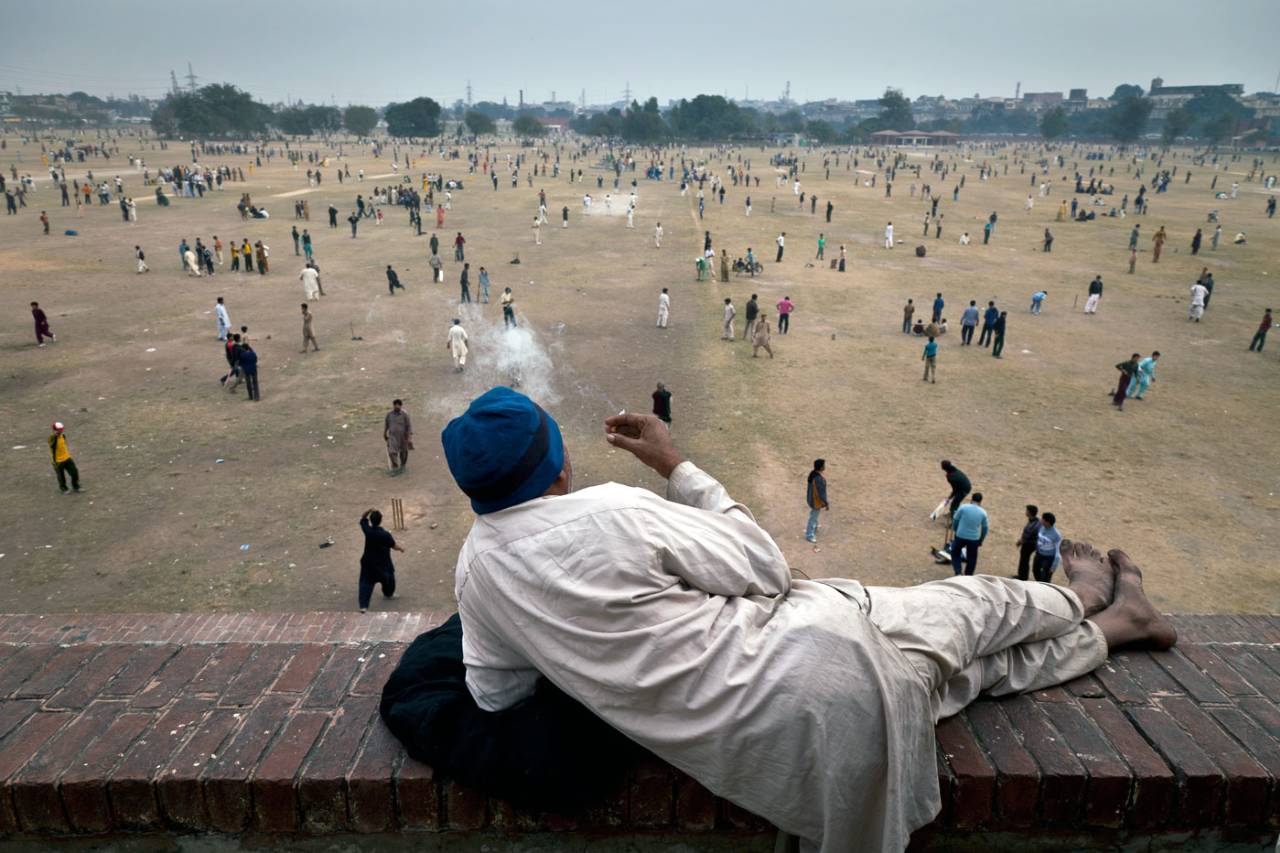Pakistan's untold tales
Tauseef Ahmed, Dera Ismail Khan, Raees Mohammad, Abdul Aziz Durani, a playboy prince and others feature in this affectionate backstory of Pakistan cricket
Kamran Abbasi
21-Aug-2016

Getty Images
As a schoolboy, one of my favourite books was a collection of cricket stories. The tales were entirely fictional, of heroic last stands and match-winning bowlers specialising in donkey drops. The stories were as much about unusual people in exceptional circumstances as they were about the sport. Cricket lends itself readily to backstory and biography.
White on Green, a follow-up to Peter Oborne's excellent Wounded Tigers, promises to paint a mesmerising picture of the fascinating events and individuals that have shaped the enigmatic cricket of Pakistan. It promises the backstory and the biography of Pakistan cricket in the words of the protagonists and through the eyes of their contemporaries.
The stories are varied and generally brief, perfect for sporadic attention. Prince Aslam, heir to the princely state of Manavadar in pre-Partition India, opens proceedings. He was a playboy cricketer who left a match once he had taken enough wickets to enjoy a party or attend to a girlfriend. He died lonely and sad.
We hear the story of Master Aziz, who was separated from his 12-year-old son during Partition. While his son, Salim Durani, went on to play for India, Aziz mentored dozens of talented Pakistani cricketers, some of whom became greats.
These, then, are as much tales of Partition and politics, of joy and loss, of the making and breaking of society and individuals, as they are of cricket and cricketers. In this sense, the political passions of the authors, Oborne and Richard Heller, shine through. What is cricket except a manifestation of the political and social evolution of a country?
And these observations benefit from the view of outsiders, less entangled in the day-to-day machinations of navigating a life and a living in Pakistan. The authors share a love of their subject and a passion for detail. Forgotten lives and events matter to their besotted eyes.
Here we find gems that matter. For instance, the story of Raees Mohammad, the fifth of the marvellous Mohammad brothers, four of whom played Test cricket for Pakistan. Hanif, the most famous of the brothers, died last week. Imagine family games of cricket in the Mohammads' garden or on their verandah. Raees is called up too but misses out in what history will judge to be a heartbreaking injustice.
What about Dera Ismail Khan, a name that will be familiar to anoraks? Dera played one first-class match and were beaten by Railways by a world-record innings and 851 runs. How did this happen? Was it, as the Wisden Almanack described, a case of Pakistan's cricket board allowing "teams with no first-class status to compete in first-class tournaments"?

Simon and Schuster
Then there's Tauseef Ahmed, impressive offspinner and potential Lionel Richie impersonator. Tauseef blagged a role as a net bowler for Pakistan's preparations for their first Test against Australia in 1980. Javed Miandad put him up in Zaheer Abbas' hotel room, and when Zaheer rang the room to pick up his messages he was shocked to hear Tauseef's voice. Once Tauseef explained what had happened, Zaheer told him to stay.
Following the net session, Tauseef returned to his club but received a call from a friend, a cinema owner from Bradford. "He told me I was in the Test team. I didn't believe him, but he told me to go home and check. I found a crowd there and thought maybe there was something in it." Tauseef was indeed selected; the offspinner in the squad, Ilyas Khan, had been dropped. Only in Pakistan.
We learn more about the cricketing lives of Billy Ibadulla, Duncan Sharpe, and Aftab Baloch. Perhaps most importantly of all, we discover the story behind the introduction of women's cricket to Pakistan, and the ignored tales of the survivors of the terrorist attack on Sri Lanka's cricketers in Lahore.
There is much to marvel at and revel in but you need to work hard to find it amid material that didn't make the final edit of Wounded Tigers. Some of the biographies of Pakistan's cricketers are well known and what's new only forms a minor part of the story. Some chapters indulge the authors and their subjects.
So enter with care. White on Green offers detail that you may not be seeking, about events that you might not care about. But for anybody with a love of cricket and cricketers' lives, of how cricket and society intertwine, of Pakistan and its idiosyncrasies and injustices, this is a volume you might have dreamt about as a child.
White on Green: A Portrait of Pakistan Cricket
By Richard Heller and Peter Oborne
Simon and Schuster UK
320 pages, £20
By Richard Heller and Peter Oborne
Simon and Schuster UK
320 pages, £20
Kamran Abbasi is an editor, writer and broadcaster. @KamranAbbasi